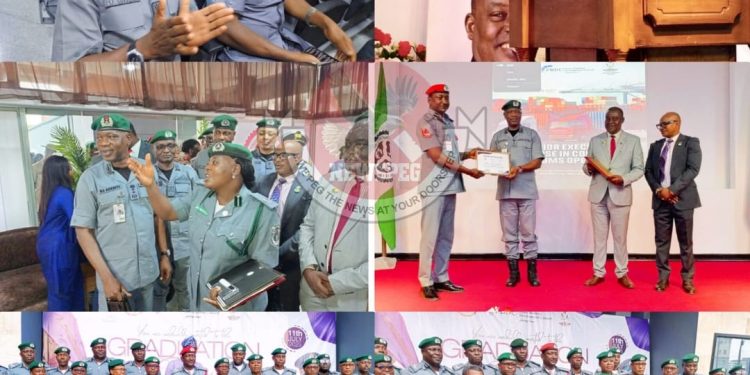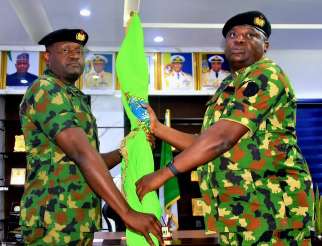By Nkechi Eze
In a bold demonstration of its commitment to continuous capacity development and operational excellence, the Nigeria Customs Service (NCS) has graduated a cohort of senior officers from its Senior Executive Course in Complex Customs Operations, held at the Nigerian Institute of International Affairs (NIIA), Lagos. The ceremony, which took place on Friday, July 11, 2025, underscored the Service’s deliberate strategy to align its workforce with the demands of a rapidly evolving global trade and security environment.
Addressing participants and dignitaries at the event, the Comptroller-General of Customs (CGC), Bashir Adewale Adeniyi, reaffirmed the Service’s unwavering dedication to capacity building, describing the just-concluded programme as an advanced tier of professional development targeted at preparing senior customs officers for high-level challenges in modern customs administration. According to the CGC, the Service has already established a number of robust platforms for training, ranging from basic and refresher courses to command and staff college programmes but the initiative at NIIA marks a significant departure and a step forward in preparing officers to operate in complex, high-stakes environments.
“We have structures for basic training, refresher courses, and command and staff college programmes, but this is a different level,” Adeniyi said. “With trainings like this, we expose our officers to global best practices, the dynamics in international trade, and how it affects their job on a day-to-day basis.”
He further explained that the course was deliberately designed to incorporate insights from international relations, global security architecture, and trade policy to position the NCS at the cutting edge of customs practice. Noting the significance of the training’s pilot edition, the CGC revealed that the programme would undergo a thorough assessment and refinement before subsequent cohorts are admitted. “We will do some evaluation. We will assess what worked, what didn’t work during the course, and what components we can add or subtract. So that will determine, actually, when we can do the second batch.”
While praising the inaugural class of participants, Adeniyi described them as accomplished professionals and future leaders within the Service who are expected to drive reform, innovation, and strategic transformation within the NCS. “As for participants, the first graduates, these are accomplished customs officers. They are the future of the service. I expect they will be ambassadors of positive changes in the service,” he said, expressing confidence in their capacity to deploy the knowledge gained towards enhancing operational efficiency and institutional integrity.
On his part, the Director-General of the Nigerian Institute of International Affairs (NIIA), Professor Eghosa Osaghae, commended the NCS leadership for placing high premium on human capital development and for recognising the link between knowledge acquisition and national advancement. He applauded the foresight behind the course and noted that the training had implications beyond the customs sector.
“This is not just for the participants; it’s for the Service,” Professor Osaghae stated. “The CGC has just been elected as Chairperson of the World Customs Organisation (WCO), acknowledging what the Service stands for. So this is part of the process of strengthening the capacity of the NCS for better delivery, especially in the light of the more complex and increasingly more challenging circumstances under which they have to operate.”
He further highlighted the relevance of the course content to contemporary global issues, stressing that partnerships between institutions like the NCS and the NIIA can yield far-reaching impact in terms of capacity enhancement, regional trade facilitation, and diplomacy.
Participants in the executive course expressed profound appreciation to the leadership of the Nigeria Customs Service for initiating the training and providing them the platform to broaden their professional horizons. According to them, the knowledge gained has provided them with a new lens for interpreting global developments and equipped them with practical tools for navigating the increasingly complex terrain of border security, customs policy, and trade governance.
The graduation ceremony, which brought together officials of the NCS, academics, policy experts, and stakeholders in international trade, marks a significant milestone in the Service’s journey toward professionalisation and institutional renewal. The Senior Executive Course in Complex Customs Operations is expected to become a flagship capacity-building programme, further consolidating the NCS’s status as a forward-looking, globally aligned institution committed to excellence and national development.

















